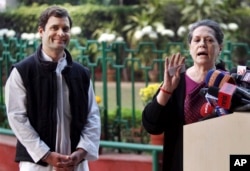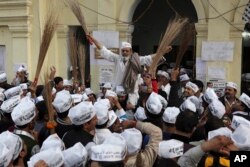NEW DELHI —
In India, the ruling Congress party is headed for a crushing defeat in elections in four key states, signaling a difficult road ahead for the party as it prepares for national elections next year. The Bharatiya Janata Party has emerged the frontrunner in these states, but it is the impressive showing in the Indian capital by a new party born on an anti-corruption plank that has captured attention.
Results released Sunday had the Congress party facing a humiliating rout in two states where it was in power, Delhi and Rajasthan.
On the other hand, the opposition Bharatiya Janata Party was headed for victory in the two states it is currently ruling - Madhya Pradesh and Chhattisgarh.
The results are a huge blow for the Congress party, but they came as no surprise. Tarnished by corruption scandals in recent years and hurt by deep anger over spiraling prices, the party has steadily lost ground during its second term in office.
The dismal showing does not augur well for the Congress party as it gets ready for the 2014 national elections.
The head of the party, Sonia Gandhi, said the results called for deep introspection.
“We have to look into the way we took or did not take our message to the people… people are obviously unhappy, otherwise they would not have given such results,” she said.
The results also reflect poorly on Rahul Gandhi, heir of the Nehru-Gandhi dynasty, who led the party’s election campaign and is widely projected as a future prime minister if the Congress party retains power.
Rahu Gandhi said he had heard the message of the people.
“The Congress party has the ability to transform itself, the Congress party has the ability to stand up to the expectations of people of this country and the Congress party is going to do that,” he said.
For the opposition Bharatiya Janata Party, a good showing in all four states came as a strong boost ahead of the 2014 elections.
Its president, Rajnath Singh, said the people had rejected the Congress party.
But as India’s two main parties counted their gains and losses, it was the impressive showing by a new party called the Aam Aadmi or Common Man’s Party, which made waves across the country.
The year-old party, formed by activists who led an anti-corruption civil society campaign two years ago, contested only in the capital Delhi. It did not win a majority. But it stunned both main parties by taking nearly 40 percent of the seats in the national capital. Voters were attracted by its promise to overhaul a political system which many believe is steeped in corruption.
Supporters celebrated in the streets, especially after the Aam Aadmi leader, Arvind Kejriwal, defeated Sheila Dikshit, a powerful Congress party politician who has been Delhi’s chief minister for 15 years.
Kejriwal said finally the country would win, democracy would win and India would win.
Political analysts said the victory of the Aam Aadmi Party reflected popular disillusionment with both the country’s main political parties and people’s desire for cleaner and more transparent governance.
Results released Sunday had the Congress party facing a humiliating rout in two states where it was in power, Delhi and Rajasthan.
On the other hand, the opposition Bharatiya Janata Party was headed for victory in the two states it is currently ruling - Madhya Pradesh and Chhattisgarh.
The results are a huge blow for the Congress party, but they came as no surprise. Tarnished by corruption scandals in recent years and hurt by deep anger over spiraling prices, the party has steadily lost ground during its second term in office.
The dismal showing does not augur well for the Congress party as it gets ready for the 2014 national elections.
The head of the party, Sonia Gandhi, said the results called for deep introspection.
“We have to look into the way we took or did not take our message to the people… people are obviously unhappy, otherwise they would not have given such results,” she said.
The results also reflect poorly on Rahul Gandhi, heir of the Nehru-Gandhi dynasty, who led the party’s election campaign and is widely projected as a future prime minister if the Congress party retains power.
Rahu Gandhi said he had heard the message of the people.
“The Congress party has the ability to transform itself, the Congress party has the ability to stand up to the expectations of people of this country and the Congress party is going to do that,” he said.
For the opposition Bharatiya Janata Party, a good showing in all four states came as a strong boost ahead of the 2014 elections.
Its president, Rajnath Singh, said the people had rejected the Congress party.
But as India’s two main parties counted their gains and losses, it was the impressive showing by a new party called the Aam Aadmi or Common Man’s Party, which made waves across the country.
The year-old party, formed by activists who led an anti-corruption civil society campaign two years ago, contested only in the capital Delhi. It did not win a majority. But it stunned both main parties by taking nearly 40 percent of the seats in the national capital. Voters were attracted by its promise to overhaul a political system which many believe is steeped in corruption.
Supporters celebrated in the streets, especially after the Aam Aadmi leader, Arvind Kejriwal, defeated Sheila Dikshit, a powerful Congress party politician who has been Delhi’s chief minister for 15 years.
Kejriwal said finally the country would win, democracy would win and India would win.
Political analysts said the victory of the Aam Aadmi Party reflected popular disillusionment with both the country’s main political parties and people’s desire for cleaner and more transparent governance.










